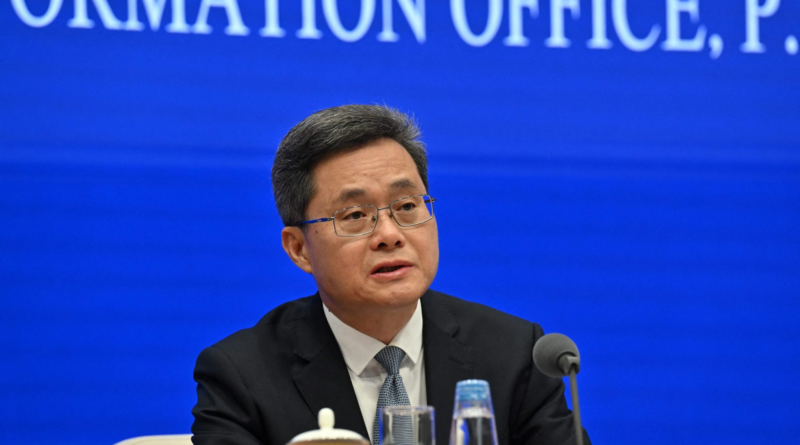China leaves economists wanting more action to defeat deflation
China moved to further ramp up support for the economy, promising more aid for the slumping property sector and indebted local governments. But officials still haven’t convinced economists that they’re doing enough to defeat deflation.
At a highly anticipated briefing on Saturday, Finance Minister Lan Fo’an refrained from putting a price tag on China’s fiscal stimulus as investors expected, signaling that details would come when China’s legislature meets in the coming weeks. The supportive measures he did announce, however, gave little indication Chinese authorities felt any urgency to ramp up consumption, which many economists see as essential to reflating the economy and putting it on a more positive growth trajectory.
“The policy to support consumption sounds quite weak,” said Jacqueline Rong, chief China economist at BNP Paribas SA. “It is still too early to call an imminent significant turnaround in deflationary pressure or a bottoming-out of the property market, which are the two key issues faced by the Chinese economy.”
Data on Sunday will probably show consumer prices in September were stuck below 1% for a 19th straight month as factory-price deflation deepened, highlighting sluggish demand before the recent stimulus bonanza. Officials spoke little about deflation at the hourlong briefing on Saturday.
Prior to the weekend, investors and analysts expected China to deploy as much as 2 trillion yuan ($283 billion) in fresh fiscal stimulus, including potential subsidies, consumption vouchers and financial support for families with children. That still might come in a few weeks: Last year, the Standing Committee of the National People’s Congress, China’s legislature, used a late-October meeting to announce a budget revision and additional bonds.
But Lan’s remarks on Saturday indicated that China is comfortable with the overall direction of the economy. He vowed to allow local governments to use special bonds to buy unsold homes and promised the biggest effort in recent years to relieve the debt burden of local authorities, neither of which is likely to provide a short-term boost to growth.
“My sense is that the fiscal policy moves will take a little too long to roll out for us to hit 5% this year, unless the ultimate scale of fiscal stimulus ends up being much larger than forecast,” said Lynn Song, chief economist for Greater China at ING Bank N.V., referring to China’s economic growth target for 2024.
Lan also hinted at room for issuing more sovereign bonds and greater government spending, steps that could be announced when legislators meet later this month or early November.
Allowing local governments to swap their debt with cheaper loans will free up money for public services and encourage the authorities to spend more. And enabling them to use special bonds to buy unsold apartments and turn them into social housing may help stabilize a downturn in real estate prices, giving homeowners a greater sense of security.
The Finance Ministry didn’t provide an exact value for either measure. But these are among steps that lead economists to think “this time can be different” after previous stimulus efforts faltered, according to Societe Generale SA.
“The prospects for a sustained recovery and reflation are improving, with better chances of housing stabilization and less pressure from local government deleveraging,” Wei Yao and Michelle Lam, both economists at the bank, said in a note.
As far as direct subsides are concerned, Lan said Saturday that China would hand out twice the number of scholarships and step up financial aid to students, a move that comes after youth unemployment rose in August to the highest level this year. He also vowed to continue to provide support to groups in need, citing a one-off handout to the poor last month as an example.
The lack of large-scale handouts is unsurprising, as Beijing has long looked down on what it calls “welfarism.”
“No free food for lazy people is the fundamental thinking of policymakers as to why large-scale subsidy for the whole nation is unlikely,” said Bruce Pang, chief economist for Greater China at Jones Lang LaSalle Inc, referring to a similar comment made by the country’s top economic planning agency.
Economists have long urged a shift in priorities for fiscal policy to focus more on domestic consumption. Such a move toward a more balanced and sustainable growth model would reduce the country’s reliance on exports to power the economy amid rising trade tensions.
The old playbook of using debt-fueled investment into public projects — from roads to bridges — has become less effective after decades of urbanization left the country saturated with infrastructure. Because of a lack of high-quality projects, authorities have more money at their disposal than projects to spend it on.
The Finance Ministry said the government will expand the sectors eligible to receive funding support from the issuance of special local bonds. This could infuse the economy with as much as 1 trillion yuan now sitting idle, according to Ding Shuang, chief economist for Greater China and North Asia at Standard Chartered Plc.
The finance woes of local governments are closely linked with the property downturn. Land sales, a major driver of revenue, are dwindling just as a broader slowdown reduces taxes and other income sources. After going on a borrowing binge following the 2008 financial crisis to prop up growth, and then dealing with a costly pandemic, many localities are now struggling to meet daily spending needs, like paying civil servants.
Some regions have opted to delay payments to contractors, impose hefty fines and slap companies with tax bills dating back decades. The moves have dealt a further blow to already fragile confidence in the private sector, prompting Beijing to warn local officials against excessive penalties.
By allowing local governments to swap more “hidden debt,” Beijing is also trying to rein in credit risks at companies that borrowed aggressively on behalf of local governments in past years to help fund infrastructure. However, bonds spent for debt swaps generate no new growth in the economy even though they help maintain financial and social stability.
Efforts to tackle local government debt risks “largely involve shifting debt from one arm of the state to another” and will have limited impact on near-term demand, said Julian Evans-Pritchard, head of China economics at Capital Economics. He maintained his 2024 growth forecast at 4.8% and revised up the forecast for next year to 4.5% from 4.3%, citing the fiscal boost.
Larry Hu, head of China economics at Macquarie Group, said that China’s two-speed growth model in which it relies on manufacturing and exports to offset the property sector is “increasingly unsustainable.” He said authorities will need to pivot once exports weaken or domestic demand deteriorates further, leading to social unrest.
“The strong sense of urgency from the September Politburo meeting suggests that it’s the pivot moment,” Hu wrote in a note on Saturday. “But to confirm this, we need more evidence.”



